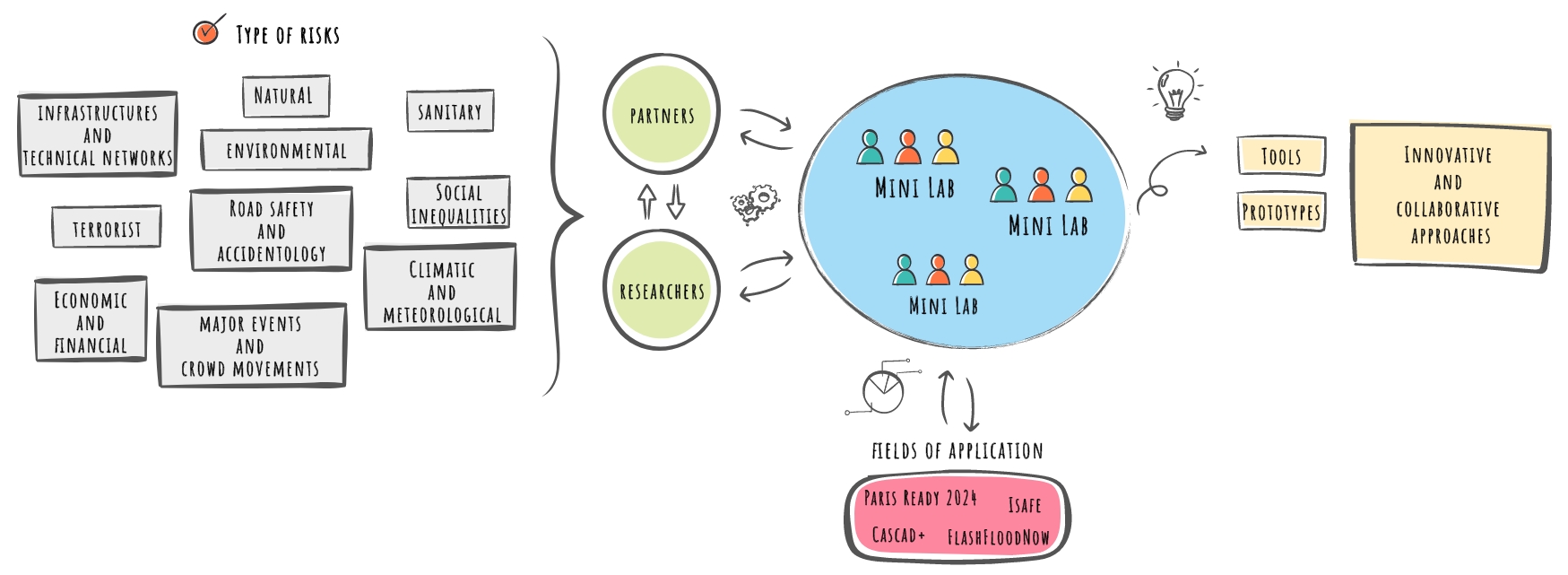
Strengthen the link between innovation and research



Analysis and data processing
The purpose of the “Analysis and Data Processing” MiniLab is to analyze Big Data. It currently focuses on two all-encompassing issues that are data optimization and reliability. To respond to the need to optimize databases, researchers affiliated with the MiniLabs develop tools and methods for grouping databases from different sources in a complementary, coherent, consolidated way, and based on which relevant, robust analyses can be conducted. This first challenge piggybacks on a second issue—that of data reliability. In that respect, the MiniLab is fostering thinking about measuring the degree of uncertainty that results from a lack of data reliability in simulations and forecasting, especially as pertains to natural and meteorological risks.
Captors and uses
Le MiniLab « Capteurs et usages » adresse la recherche pluridisciplinaire liant l’expertise du consortium dans les domaines des technologies des capteurs innovants (santé et environnement), du traitement automatisé des données (télédétection et vision artificielle) et des nouveaux usages sociétaux (citoyen-capteur, approches participatives). Fort de la capacité de proposer/intégrer des nouveaux capteurs, de les lier à des techniques de l’intelligence artificielle et de les confronter à la réalité du terrain, le « MiniLab » permet d’apporter des solutions innovantes de bout en bout pour la prévention et gestion de crise dans le domaine public ou industriel.
Actuellement, il se focalise sur deux thèmes principaux :- nouvelles technologies et méthodes pour la prévention, le suivi et la caractérisation des inondations ;
- nouveaux capteurs et méthodes de modélisation des impacts des accidents de la route pour une optimisation des secours.
Visualizations
Visualization describes both a science and techniques for designing and using information that, once processed, can give way hypotheses, allowing for the development of solutions and/or building knowledge. However, visualization in times of crisis differs from visualization during researchers’ more typical down time. Decision makers must have access to information quickly and in a way that is understandable. The visualization display must therefore be functional immediately. To meet this challenge, the “Visualizations” MiniLab centers on three scientific considerations: 1) the representation of complex data, including probabilistic information; 2) co-design and co-creation with users, so that the visualization meets the requirements and skills of the latter, and; 3) extraction and use of textual information and images. The MiniLab’s research aims to:
- Co-build knowledge of territories;
- Co-build the visualization tools with the end user;
- Produce of geovisualization that is useful for analysis and decision-making.
Information flow in a degraded conditions
As the causes of deterioration can be multiple (flooding, earthquakes, terrorist attacks, crowd movements, etc.), the “Information flow in degraded conditions” MiniLab incorporates technological and societal issues. The MiniLab strives to address a variety of topics, including the needs of target users, the quality of the data, the interpretation and transfer of information in crisis situations, and even the societal impact of deteriorated information (fake news, etc.). Although the MiniLab focus on deteriorated conditions, per its title, thinking on information flows prior to crisis situations is being enacted, notably with regard to flood prevention. In this way, the goals of the research being conducted in this MiniLab are extremely diverse:
- Top-down warning system;
- Prioritization, assembly and synthesis of information for emergency services;
- Communication under stress and during crises;
- The sharing and misinterpretation of information;
- The link between information, visualization and interpretation;
- Reconstitution of damaged texts.